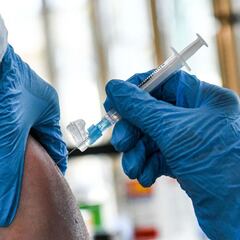Johnson & Johnson vaccine pause: the reasons, timeline & reaction
Jeffrey D. Zients, the White House’s pandemic coordinator, said that the pause would not generally interrupt the momentum of the country’s vaccination campaign.

On Wednesday, an advisory committee for the Centers for Disease Control and Prevention met to discuss the decision made on Tuesday to pause use of the Johnson & Johnson covid-19 vaccine because of its possible link to extremely rare blood clots. After the discussion, the panel decided they needed more time to assess the data and risks, and would not vote on a recommendation until they meet again in a week or 10 days.
The emergency meeting came following the Food and Drug Administration’s announcement on Tuesday that it was studying six cases of rare and severe blood clots in women aged 18 to 48, one of whom died. Following the call from federal health agencies on Tuesday, all 50 states, Washington, D.C., and Puerto Rico quickly paused or recommended that providers pause the administration of the vaccine.
Pause won't interrupt momentum
Use of the vaccine began on March 2, and the first case of blood clots in the brain was reported on March 19. About 1.4 million women ages 20 to 50 - the age range of those who had the clots - received the vaccine.
At a news conference, Jeffrey D. Zients, the White House’s pandemic coordinator, said that the pause would not generally interrupt the momentum of the country’s vaccination campaign.
“In the very short term, we do expect some impact on daily averages as sites and appointments transition from Johnson & Johnson to Moderna and Pfizer vaccines,” he said. “We have more than enough Pfizer and Moderna vaccine supply to continue or even accelerate the current pace of vaccinations.”
Johnson & Johnson covid-19 vaccine pause
According to the initial report the six recipients were women between the ages of 18 and 48. One woman died and a second woman in Nebraska has been hospitalised in critical condition.
J&J VACCINE PAUSE: A CDC panel has left a temporary pause of the Johnson & Johnson vaccine in place, saying they need more data after reports of six women suffering rare blood clots after receiving the shot. @SteveOsunsami reports. https://t.co/zpT2rm5rkw pic.twitter.com/ZP5xLv33Qo
— World News Tonight (@ABCWorldNews) April 15, 2021
The Centers for Disease Control and Prevention (CDC) and the Food and Drug Administration (FDA) said on Tuesday that they were investigating clots in six women that occurred between six to 13 days after they had the vaccination administered. The clots had been observed in the sinuses of the brain along with reduced platelet counts, thus making the use ot heparin to thin the blood, the usual treatment for blood clots, potentially dangerous.
Mass vaccination sites used as part of the federal rollout will halt their use of the J&J drug but they will continue with the other two authorised vaccines from Moderna and Pfizer.
Dr Fauci statement on J&J vaccine
Dr Anthony Fauci, Director of the US National Institute of Allergy and Infectious Diseases and the chief medical advisor to the president, has outlined the purpose of suspending the Johnson & Johnson vaccine.
Dr. Anthony Fauci, the nation's top infectious disease expert, says the recommended pause on the Johnson & Johnson Covid-19 vaccine is just that: a pause -- and not a cancellation -- and will likely last days to weeks. https://t.co/Xp83nIfZfM
— CNN (@CNN) April 15, 2021
In an interview with CNN, he described the two main intentions of the decision, both to give extra time to investigate the effects of the vaccine and to ensure that those who have already received a shot are cared for properly. Although the blood clot side effect has so far only been found in fewer than one in every million recipients, the White House is eager to assuage any fears about the vaccine.
CDC Director on the J&J pause
We still encourage you to get a vaccine when one is available to you. Pfizer & Moderna vaccines still being administered. People w. vaccine appointments should keep them, & we'll work w/ partners to reschedule those that were intending to get J&J vaccine. https://t.co/wU0sqJzbII
— Rochelle Walensky, MD, MPH (@CDCDirector) April 14, 2021
In a online press conference for the White House's Covid-19 Response Team, CDC Director Rochelle Walensky explained the reason for the pause on adminstering more doses of the Johnson & Johnson vaccine.
Both the CDC and the FDA intend to carry out further study into the six reported instances of blood clots amongst recipients of the J&J vaccine, to better inform doctors about the risks. They will also look to find other examples of blood clots amongst patients who have had the vaccine and perfect a more general evaluation of the J&J shot.
J&J statement
On the back of the news going public, Johnson & Johnson issued a statement:
“We are aware that thromboembolic events including those with thrombocytopenia have been reported with covid-19 vaccines.”
“At present, no clear causal relationship has been established between these rare events and the Janssen covid-19 vaccine.
What should you do if you have had the J&J vaccine?
The current recommendation is that if you have already received the Johnson & Johnson vaccine and within three weeks of the shot you experience either severe headaches, abdominal pains, leg pain, or shortness of breath, then you should contact your local doctor.
What to make of the Johnson & Johnson vaccine pause? CNN’s medical analyst Dr. Leana Wen, who got J&J herself, says not to worry. https://t.co/5f8M3jkWLt
— Jon Cooper (@joncoopertweets) April 15, 2021
Related stories
It is also worth noting that amid the ongoing headlines, the European Medicines Agency has indeed highlighted that the benefits of receiving the vaccine outweigh the risks for the majority of people. The vast majority of the 6.8 million doses of the J&J vaccine have shown no either no side effects or simply mild reactions.
Follow our live updates on the latest US coronavirus vaccine news.

